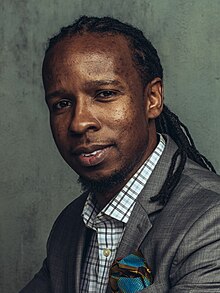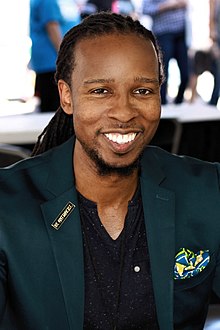
Boston University (BU) is a private research university in Boston, Massachusetts. BU was founded in 1839 by a group of Boston Methodists with its original campus in Newbury, Vermont. It was chartered in Boston in 1869. The university is a member of the Association of American Universities and the Boston Consortium for Higher Education.

John Hamilton McWhorter V is an American linguist with a specialty in creole languages, sociolects, and Black English. He is currently an associate professor of linguistics at Columbia University, where he also teaches American studies and music history. He has authored a number of books on race relations and African-American culture, acting as political commentator especially in his New York Times newsletter.
Racial literacy is a concept developed by sociologist France Winddance Twine. She describes it as "a form of racial socialization and antiracist training that ... parents of African-descent children practiced in their efforts to defend their children against racism" in her research done in the United Kingdom with mixed-race families.
Negroid is an obsolete racial grouping of various people indigenous to Africa south of the area which stretched from the southern Sahara desert in the west to the African Great Lakes in the southeast, but also to isolated parts of South and Southeast Asia (Negritos). The term is derived from now-disproven conceptions of race as a biological category.
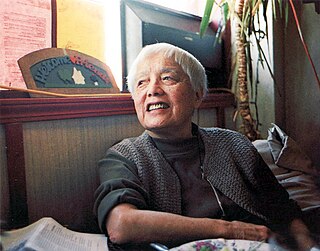
Grace Lee Boggs was an American author, social activist, philosopher, and feminist. She is known for her years of political collaboration with C. L. R. James and Raya Dunayevskaya in the 1940s and 1950s. In the 1960s, she and James Boggs, her husband of some forty years, took their own political direction. By 1998, she had written four books, including an autobiography. In 2011, still active at the age of 95, she wrote a fifth book, The Next American Revolution: Sustainable Activism for the Twenty-First Century, with Scott Kurashige and published by the University of California Press. She is regarded as a key figure in the Asian American, Black Power, and Civil Rights movements.

Post Traumatic Slave Syndrome: America's Legacy of Enduring Injury and Healing is a 2005 theoretical work by Joy DeGruy Leary. The book argues that the experience of slavery in the United States and the continued discrimination and oppression endured by African Americans creates intergenerational psychological trauma, leading to a psychological and behavioral syndrome common among present-day African Americans, manifesting as a lack of self-esteem, persistent feelings of anger, and internalized racist beliefs. The book was first published by Uptone Press in Milwaukie, Oregon, in 2005, with a later re-release by the author in 2017.

Anti-racism encompasses a range of ideas and political actions which are meant to counter racial prejudice, systemic racism, and the oppression of specific racial groups. Anti-racism is usually structured around conscious efforts and deliberate actions which are intended to create equal opportunities for all people on both an individual and a systemic level. As a philosophy, it can be engaged in by the acknowledgment of personal privileges, confronting acts as well as systems of racial discrimination and/or working to change personal racial biases. Major contemporary anti-racism efforts include the Black Lives Matter (BLM) movement and workplace anti-racism.

Jason Reynolds is an American author of novels and poetry for young adult and middle-grade audience. Born in Washington, D.C., and raised in neighboring Oxon Hill, Maryland, Reynolds found inspiration in rap and had an early focus on poetry, publishing several poetry collections before his first novel in 2014, When I Was The Greatest, which won the John Steptoe Award for New Talent.

Joel Christian Gill is an American cartoonist, educator, and author of a number of graphic novels from Fulcrum Publishing: Strange Fruit Vol I : Uncelebrated Narratives from Black History, Bass Reeves: Tales of the Talented Tenth No.1, and Bessie Stringfield: Tales of the Talented Tenth, No. 2, Strange Fruit Vol II: More Uncelebrated Narratives from Black History, a picture book "Fast Enough: Bessie Stringfield's First Ride" from Lion Forge and Fights: One Boys Triumph Over Violence a memoir about how children deal with trauma and abuse from Oni Press. He has taught studio art, Illustration and comics while serving as Chair of the Comic Arts and Foundations programs at the New Hampshire Institute of Art. In the Fall of 2019 he accepted an appointment as Associate Professor of Illustration at Massachusetts College of Art and Design. In 2020 he began work on an adaptation of Dr. Ibram X Kendi's Stamped from the Beginning a Definitive History of Racist Ideas in America for Ten Speed Press.

Stamped from the Beginning: The Definitive History of Racist Ideas in America is a non-fiction book about race in the United States by the American historian Ibram X. Kendi, published April 12, 2016 by Bold Type Books, an imprint of PublicAffairs. The book won the National Book Award for Nonfiction.

Djamila Taís Ribeiro dos Santos is a Brazilian Black feminist philosopher and journalist. She graduated in political philosophy from the Federal University of São Paulo, where she also earned a master's degree on the work of Simone de Beauvoir and Judith Butler. Ribeiro is a collaborating editor of weekly magazine CartaCapital, as well as a columnist for CartaCapital and Folha de S.Paulo.
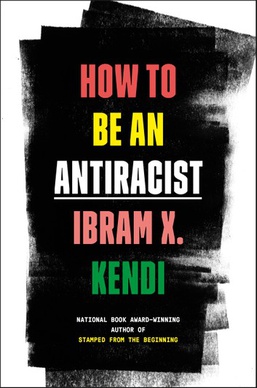
How to Be an Antiracist is a 2019 nonfiction book by American author and historian Ibram X. Kendi, which combines social commentary and memoir. It was published by One World, an imprint of Random House. The book discusses concepts of racism and Kendi's proposals for anti-racist individual actions and systemic changes.

Ashley Lukashevsky is an American visual artist, illustrator, and graphic designer. Her work mainly focuses on social movements and issues, including LGBTQ+ rights, Black Lives Matter, and immigrant rights. She has created work for the American Civil Liberties Union (ACLU), Planned Parenthood, and Rock the Vote.
Joy Angela DeGruy is an American author, academic, and researcher, who previously served as assistant professor at the Portland State University School of Social Work. She is currently president and CEO of DeGruy Publications, Inc and Executive Director of the non-profit Be The Healing, Inc. She is mostly known for her book Post Traumatic Slave Syndrome, originally published by UpTone Press in 2005 and revised and republished in 2017 by Joy DeGruy Publications, Inc. DeGruy and her research projects have featured in news and activist coverage of contemporary African-American social issues, in addition to public lectures and workshops on U.S. college campuses that include: Morehouse School of Medicine, Fisk University, Spelman College, Harvard University, Yale University, Princeton University, Smith College, Massachusetts Institute of Technology (MIT). Dr. DeGruy has spoken at the United Nations, UNESCO, C-SPAN, Oxford University, Association of Black Psychologists, National Association of Social Workers, the World Bank, The Essence Festival, and featured in Essence Magazine, and films that include "Cracking the Codes," a film by Shakti Butler, "InVisible Portraits" by Oge Egbuonu on the Oprah Winfrey Network (OWN), among others. Dr. Degruy has also received a 2021 grant from the MacArthur Foundation to further her healing work.
The Emancipator is an online newspaper on topics of racial justice, co-founded by Ibram X. Kendi of Boston University and Bina Venkataraman of The Boston Globe.
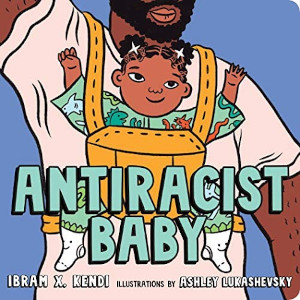
Antiracist Baby is a 2020 children's book written by Ibram X. Kendi and illustrated by Ashley Lukashevsky. The book, inspired by the author's four-year-old daughter, was conceived as a tool for discussing racism with young children. The book proposes nine steps for discussing racism, with the ultimate goal of teaching children to be antiracist. The book states that "Antiracist Baby is bred not born. Antiracist Baby is raised to make society transform" and that a choice is necessary: "babies are taught to be racist or antiracist—there's no neutrality."

Four Hundred Souls: A Community History of African America, 1619–2019 is a 2021 anthology of essays, commentaries, personal reflections, short stories, and poetry, compiled and edited by Ibram X. Kendi and Keisha N. Blain. Conceived and created to commemorate the four hundred years that had passed since the arrival of the first Africans in Virginia, the book concerns African-American history and collects works written by ninety Black writers. A winner or finalist of multiple awards in its print and audiobook editions, Four Hundred Souls has been widely praised by reviewers for its prose and historical content.

Frederick Joseph is an American author. He has written two The New York Times bestselling books,The Black Friend: on being a better white person, a social justice book aimed at younger readers based on his own experiences as Black youth in Westchester County, New York and subsequent college years. and Patriarchy Blues: Reflections on Manhood (2022). He has also written two other titles: Better Than We Found It (2022) and Black Panther: Wakanda Forever - The Courage to Dream (2022). He has been published on the topics of marketing, culture, and politics in various publications including HuffPost, USA Today, NowThisNews, and The Independent. Joseph also received media attention for a fundraising initiative for rent relief program in the early months of the COVID-19 pandemic.

Since 2020, efforts have been made by conservatives and others to challenge critical race theory (CRT) being taught in schools in the United States.
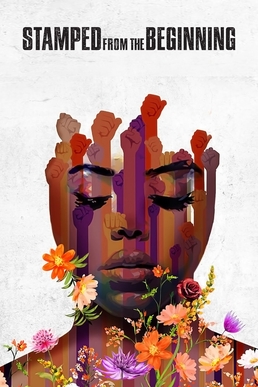
Stamped from the Beginning is an 2023 American documentary film, directed and produced by Roger Ross Williams. It is based upon the non-fiction book of the same name by Ibram X. Kendi.
